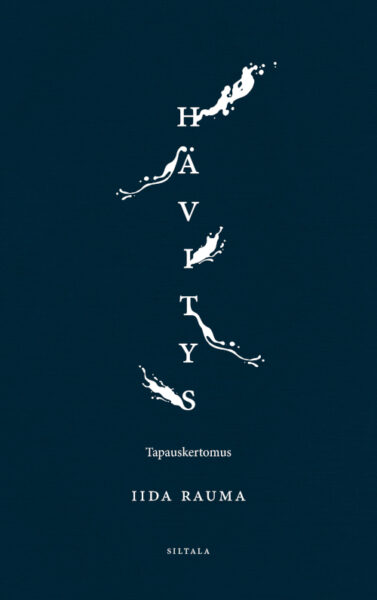A fierce novel about the universal mechanisms of social oppression.
Author: Iida Rauma
Finnish original: Hävitys
Publisher: Siltala, 2021
Genre: literary fiction
Number of pages: 400 pp.
Reading material: Finnish original, English sample, English synopsis
Rights sold: Czech, Argo; Danish, Jensen & Dalgaard; Hungarian, Magvető; Swedish, Rámus
While jogging at night, A sees a familiar figure at the city’s desolate fringes and realizes nothing ends, nothing is over. This encounter triggers a feverish journey through the city’s ravaged landscape and into painful memories from the 1990s, marked by school bullying.
Iida Rauma’s third novel asks how one can write about oneself if one’s own self has been shattered. How can we document the horrors of one’s childhood in a culture where adults hate children and want to erase the traces of past wrongs?
Destruction delves into themes of trauma, memory and societal violence. The novel has been widely praised by critics and readers alike for its literary merits, acuity and skillful storytelling, which maintains a high level of intensity thoughout the novel. The book was awarded the Finlandia Prize, the most prestigious literary award in Finland. It received a honorable mention at the European Union Prize for Literature in 2023, the jury describing it as “a literary masterpiece and a unique work of art”. Helsingin Sanomat newspaper listed is as the seventh best book of the 21st century.
“The depiction of bullying is this novel’s cold, hard core. The 200-page passage can be considered a literary masterpiece and utterly unique.”
– Suomen Kuvalehti magazine
“Destruction is first and foremost an artistic endeavor, a novel in complete control of its idiom, and as such a stunning tour de force. […] Destruction alternates between varying narrative techniques and registers, maintaining its intensity all the while, and complements fiction with facts, facts with a vivid experientiality.”
– Helsingin Sanomat newspaper
Also available:
On Sex and Mathematics (2015)
The Book of Disappearances (2011)
About the author:
Iida Rauma
